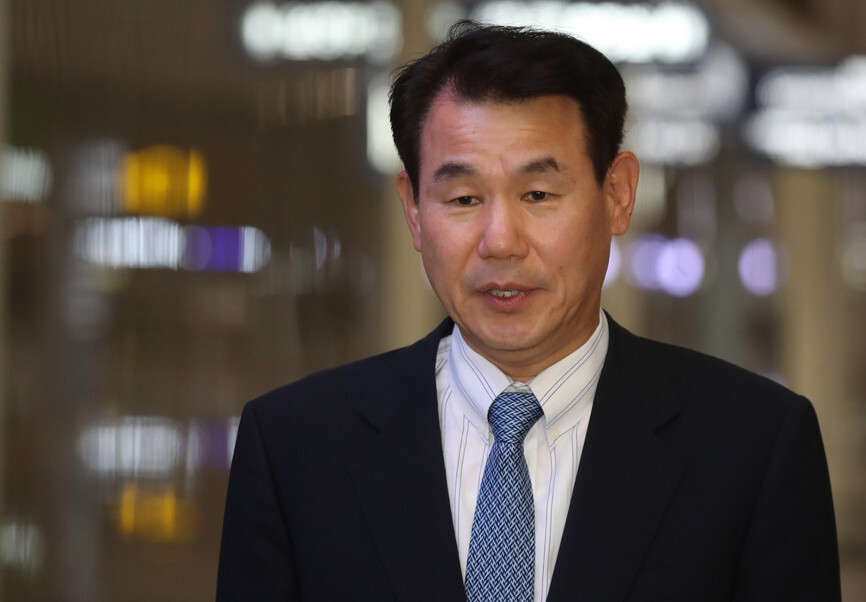hankyoreh
Links to other country sites 다른 나라 사이트 링크
Korea, US reach consensus on certain aspects during defense cost-sharing talks

A key member of the South Korean delegations for negotiations on the 11th South Korea-US Special Measures Agreement (SMA) on defense cost-sharing, which goes into effect next year, said the two sides had “each clarified their respective positions to the other and shared views on certain aspects.”
A key official on the negotiating team made those remarks while telling reporters on Oct. 28 about the outcome of the second round of negotiations for the 11th defense cost-sharing agreement, known as the Special Measures Agreement (SMA). The second round was held in Honolulu, Hawaii, on Oct. 22-24.
This official’s remarks indicate that South Korea and the US shared their respective positions and confirmed their differences in opinion while reaching consensus in certain areas. “There are always two parties in negotiations. I’m not allowed to get into the details until we reach some kind of conclusion,” the official said, declining to specify the areas on which South Korea and the US reconfirmed their disagreement and the areas on which they’d forged a consensus.
However, the two sides appear to have reached the basic position that they should make an effort to conclude the 11th SMA by the end of the year, when the 10th SMA concludes. “Fundamentally, I think we ought to be trying to wrap this up by the end of the year,” the official said.
The official made the following remarks about the principles and determination shown by South Korean chief negotiator Chung Eun-bo, who joined the negotiations in this round. “I think that there will be an additional role [for Chung] to play because the economy and budget need to be considered alongside defense and diplomacy and because they [the economy and the budget] need to be reflected in our ultimate goal of achieving fair, equitable, and reasonable cost-sharing.”
While diplomacy and security are elements that must always be considered in negotiations over defense costs, the very appointment of a former official from the Ministry of Economy and Finance as chief negotiator communicates the government’s determination to put up a better showing this time around.
The official was also asked about the possibility of changing the method of calculating South Korea’s defense contribution during the negotiations from the current “total amount” method to a “need-based” method that would assess the amount required for specific needs. “I think that all such matters are included in the process of the deliberations,” the official said.
During the latest negotiations, South Korea appears to be once again pushing for maintaining the SMA’s current framework, which includes the cost categories of personnel costs (wages for Koreans working for US Forces Korea), military construction costs (construction of facilities on American bases), and material support costs (providing support for services and supplies). But if previous reports are correct, the US has called for expanding the number of current categories to engineer a huge boost in South Korea’s defense contribution.
During an audit of government activity by the National Assembly’s Legislation and Judiciary Committee on Oct. 18, Democratic Party lawmaker Lee Cheol-hui claimed the US was asking South Korea to cover costs that had previously been omitted from the cost-sharing agreement or handled separately, including the deployment of strategic assets, joint military exercises, and support for the families of US troops. Those additional costs would add up to US$3 billion, Lee said.
“We’re getting demands [from the Americans] that we didn’t used to get,” confirmed South Korean Minister of Foreign Affairs Kang Kyung-wha during an audit by the National Assembly’s Foreign Affairs and Unification Committee on Oct. 21.
Sources connected with the government say the US is arguing for the need for South Korea’s defense contribution to be yanked up as high as US$5 billion.
By Noh Ji-won, staff reporter
Please direct comments or questions to [english@hani.co.kr]

Editorial・opinion
![[Column] Life on our Trisolaris [Column] Life on our Trisolaris](https://flexible.img.hani.co.kr/flexible/normal/500/300/imgdb/original/2024/0505/4817148682278544.jpg) [Column] Life on our Trisolaris
[Column] Life on our Trisolaris![[Editorial] Penalties for airing allegations against Korea’s first lady endanger free press [Editorial] Penalties for airing allegations against Korea’s first lady endanger free press](https://flexible.img.hani.co.kr/flexible/normal/500/300/imgdb/original/2024/0502/1817146398095106.jpg) [Editorial] Penalties for airing allegations against Korea’s first lady endanger free press
[Editorial] Penalties for airing allegations against Korea’s first lady endanger free press- [Editorial] Yoon must halt procurement of SM-3 interceptor missiles
- [Guest essay] Maybe Korea’s rapid population decline is an opportunity, not a crisis
- [Column] Can Yoon steer diplomacy with Russia, China back on track?
- [Column] Season 2 of special prosecutor probe may be coming to Korea soon
- [Column] Park Geun-hye déjà vu in Yoon Suk-yeol
- [Editorial] New weight of N. Korea’s nuclear threats makes dialogue all the more urgent
- [Guest essay] The real reason Korea’s new right wants to dub Rhee a founding father
- [Column] ‘Choson’: Is it time we start referring to N. Korea in its own terms?
Most viewed articles
- 160% of young Koreans see no need to have kids after marriage
- 2[Reporter’s notebook] In Min’s world, she’s the artist — and NewJeans is her art
- 3Hybe-Ador dispute shines light on pervasive issues behind K-pop’s tidy facade
- 4[Column] Life on our Trisolaris
- 5[Editorial] Penalties for airing allegations against Korea’s first lady endanger free press
- 6Presidential office warns of veto in response to opposition passing special counsel probe act
- 7S. Korea discusses participation in defense development with AUKUS alliance
- 8Vietnamese war victims speak of sexual violence by S. Korean troops for the first time
- 9Months and months of overdue wages are pushing migrant workers in Korea into debt
- 10Inside the law for a special counsel probe over a Korean Marine’s death